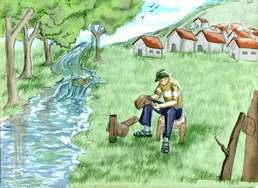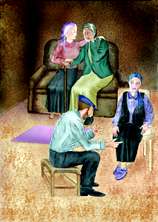

From Stolin to Tel-Aviv.
By Nachum Alovitch. Translated by Rosally Saltsman; with illustrations by Ruti Houpt.
My grandfather’s name was Avraham Aharon. He was born in Stolin, a small town in White Russia, a poor country with extensive forests and gushing rivers, beautiful lakes and large swamps. Despite the great poverty and the hostility of the government, Jewish life blossomed and thrived and was rich with accomplishment, culture and Zionism.
Our family name from days gone by was Etzioni – man of the tree. Avraham Aharon’s grandfather had already done business in the tree trade and that was where the name came from. He rented tracts of forest from the Polish poritz, cut down its trees and floated them down the river to be processed in the sawmills. Grandfather’s father, Asher Lemel, was a man who combined work in the tree industry with working as a Sofer Stam. He wrote Torah scrolls, Tefillin and Mezuzahs on parchment. He would also write, amazingly, blessings on small grains of wheat.
 Grandfather
Avraham Aharon became orphaned from his father when he was twelve years
old. Right after the death of his father, he began working with his
family in the sawmill and building roofs from wood. He was quickly
found to be a diligent lad with golden hands. He loved his work very
much and was dedicated to it. His reputation as an excellent wood
craftsman spread. Grandfather Avraham Aharon was a smart man and
beloved by everyone.
Grandfather
Avraham Aharon became orphaned from his father when he was twelve years
old. Right after the death of his father, he began working with his
family in the sawmill and building roofs from wood. He was quickly
found to be a diligent lad with golden hands. He loved his work very
much and was dedicated to it. His reputation as an excellent wood
craftsman spread. Grandfather Avraham Aharon was a smart man and
beloved by everyone.Many eagerly sought his doorstep either for a request, advice and encouragement or financial help. Many of the Jews of the town, like most Jews in Russia and Poland, were people of difficult circumstances who weren’t always able to get their hands on food and fuel to heat their homes for their large families. They would go to sleep, not always knowing whether the next day they would have enough food for themselves and their families.
 The
harsh winter with the cold and snow was especially difficult for them
and Grandfather, as was his custom, with a shining face and much
gentleness, never turned away any man who turned to him. His hand was
open and large and he would secretly bring food, clothing and logs for
the fire to the needy. Grandfather’s sisters Chava and Miriam
were also smart women and strong-minded. They were known for their
charitable deeds, acts of kindness and generosity.
The
harsh winter with the cold and snow was especially difficult for them
and Grandfather, as was his custom, with a shining face and much
gentleness, never turned away any man who turned to him. His hand was
open and large and he would secretly bring food, clothing and logs for
the fire to the needy. Grandfather’s sisters Chava and Miriam
were also smart women and strong-minded. They were known for their
charitable deeds, acts of kindness and generosity.Not only women came to their door but also men came to present them with their problems. And they in their great wisdom helped people not only with personal matters but with business matters as well.
Grandfather had a small barn in his yard with two cows: Devorah and Repkeh. Devorah was a regular cow, not particularly smart, not exceptionally stupid. But Repkeh was a smart cow whose reputation was well known.
 Early
in the morning, when it was still dark, Ivanchik, the Russian shepherd
would take the cows out to pasture. They grazed in the green meadow and
towards evening he would return them to the yard. The clever Repkeh
would return by herself from the meadow to the wooden gate that
Grandfather had built. She would raise her head, butt gently with her
horns and raise the piece of wood that served as a latch. Then she
would easily push the gate open with her shoulder and step gently
inside.
Early
in the morning, when it was still dark, Ivanchik, the Russian shepherd
would take the cows out to pasture. They grazed in the green meadow and
towards evening he would return them to the yard. The clever Repkeh
would return by herself from the meadow to the wooden gate that
Grandfather had built. She would raise her head, butt gently with her
horns and raise the piece of wood that served as a latch. Then she
would easily push the gate open with her shoulder and step gently
inside.